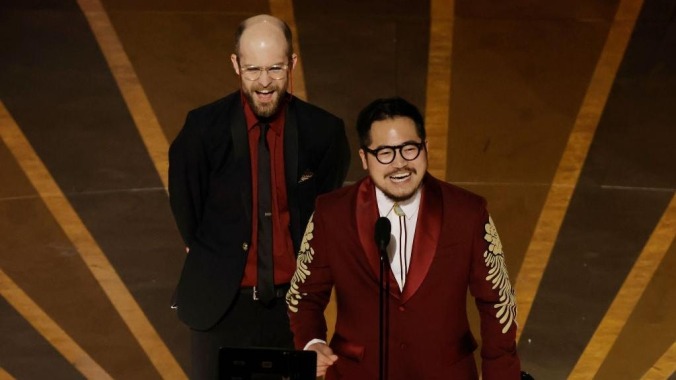Oscars 2023 review: A night of powerful moments and joyous speeches
Everyone wins when Everything Everywhere wins, Jimmy Kimmel (mostly) shines, and the Oscars overcome some shameless corporate synergy

Every year there is an obvious tension when the Academy Awards roll around. Mostly because it showcases a terse relationship between what’s being celebrated (CINEMA!) and where it’s being celebrated (TELEVISION!). ABC’s telecast needs to think of itself as something to satiate viewers worldwide—many of whom, as the box office returns of a few high-profile nominees attest—may not have seen, let alone heard of. It’s no surprise that year in and year out, the show’s producers lean into celebrating “the magic of the movies.” That’s precisely how the 95th Academy Awards began, with a montage that, without a hint of irony, showed clips from non-nominated films like NOPE and The Woman King. And arguably how it ended, with Harrison Ford reminding us that “movies can transform our lives” before handing out the Best Picture Oscar to the big winner of the night, Everything Everywhere All At Once.
The Daniels managed to keep each of their three visits to the stage fresh and exciting, closing out the night with a message about how stories up on the big screen can shelter us from the chaos around us. It marked a fitting end to the unlikely awards run the Academy Awards has gifted us, especially after the whiplash years of Green Book, Parasite, Nomadland, and CODA. It was all a reminder that those behind the Oscars show can only work with the nominees (and winners) they’re given, so it’s always hard to quibble with either when assessing whether the telecast was a success.
And so, whether you agree that Jamie Lee Curtis gave the best performance in her category (one of the first to be awarded), you can’t deny the power of her speech, one which embraced the spirit of cinema as a collaborative endeavor, as the kind that builds relationships across screens, between actors and fans, between filmmakers and viewers. “WE WON AN OSCAR!” is a perfect line to capture the way many of us should think about awards. Not as an individual achievement but as a group endeavor. Not only in that parasocial way in that genre fans of Curtis’ can now bask in her win, but in the sense that publicity teams, critics, voters, managers, designers, handlers, and the like are all part of this awards ecosystem. One where wins say more (and less!) than what we’d want to believe.
But if the Scream Queen’s speech, dovetailing nicely with the heartfelt one offered by fellow Everything Everywhere All At Once co-star Ke Huy Quan (“Mom, I won an Oscar!”), set the tone for the start of the evening, it was in its ebullience. This was a show that featured David Byrne singing with hot dog figures, the RRR “Naatu Naatu” dancers giving it their all, a “Happy Birthday” serenade in lieu of an acceptance speech, a Cocaine Bear cameo, a “drag is a threat to NO ONE!” call out, a Carpenters shout out, and arguably one of the best one-liner opener moments of any speech in recent memory—that’d be Sarah Polley, winning the Best Adapted Screenplay award for Women Talking: “I want to thank the Academy for not being mortally offended by the words ‘women’ and ‘talking’ being put so close together like that.”
Corporate Synergy Wins Again (We All Lose)
Not all was perfect, though. It can never be.
The shamelessness with which Disney used the telecast to premiere the murky-looking CGI-heavy trailer for their live-action The Little Mermaid film coming out later this year was yet another reminder that we live in a corporate hellscape. One where, yes, as host Jimmy Kimmel joked at the top of the show, Hollywood has seemingly run out of ideas (it’s why Steven Spielberg had to make a movie about … Steven Spielberg, the joke continued). It’s an odd message to receive from three hours where an action comedy flick featuring sex toy fights and a Ratatouille spoof won the biggest award of the night.
But still, it’s hard to shake off—especially when a montage celebrating Warner Bros.’ century leaned heavily on its contemporary franchises and obscured the many original films it produced during its first few decades. The fact that said montage looked not unlike the Rolex and Walt Disney Studios ads that aired during the telecast suggests we may be dealing with bigger questions about the way Hollywood sees and chooses to mythologize itself. See also: the way Janet Yang used her moment on stage to push the Academy museum. We can look back, but ultimately, it’ll be to those films that made money, not the quiet ones that made history (so seldom are they one and the same).
And yes, we’d be hard-pressed not to mention the fact that corporate synergy is what brought us yet another year of Kimmel hosting. Sure, we don’t know what movie stars would, in this day and age, take up this most thankless of Hollywood gigs (and that was before we all saw what happened to Chris Rock last year!), so, we should be thankful we got Kimmel, as gifted a host as we’d all want for a breezy if aggressively efficient awards show. The late-night staple, after all, is someone who can make a joke like “My Banshees are caught in my Inisherin” in earnest and get a laugh, make a line like “L. Ron Hubba Hubba” sing—all while inserting a Nick Cannon joke into an extended Avatar bit, making Malala have to think about the endless Don’t Worry Darling press tour, and yet again feeding his fake feud with Matt Damon. Kimmel did Kimmel, and if he’d made one less slap/Will Smith joke maybe I’d be more inclined to sing more of his praises.
 Keep scrolling for more great stories.
Keep scrolling for more great stories.
